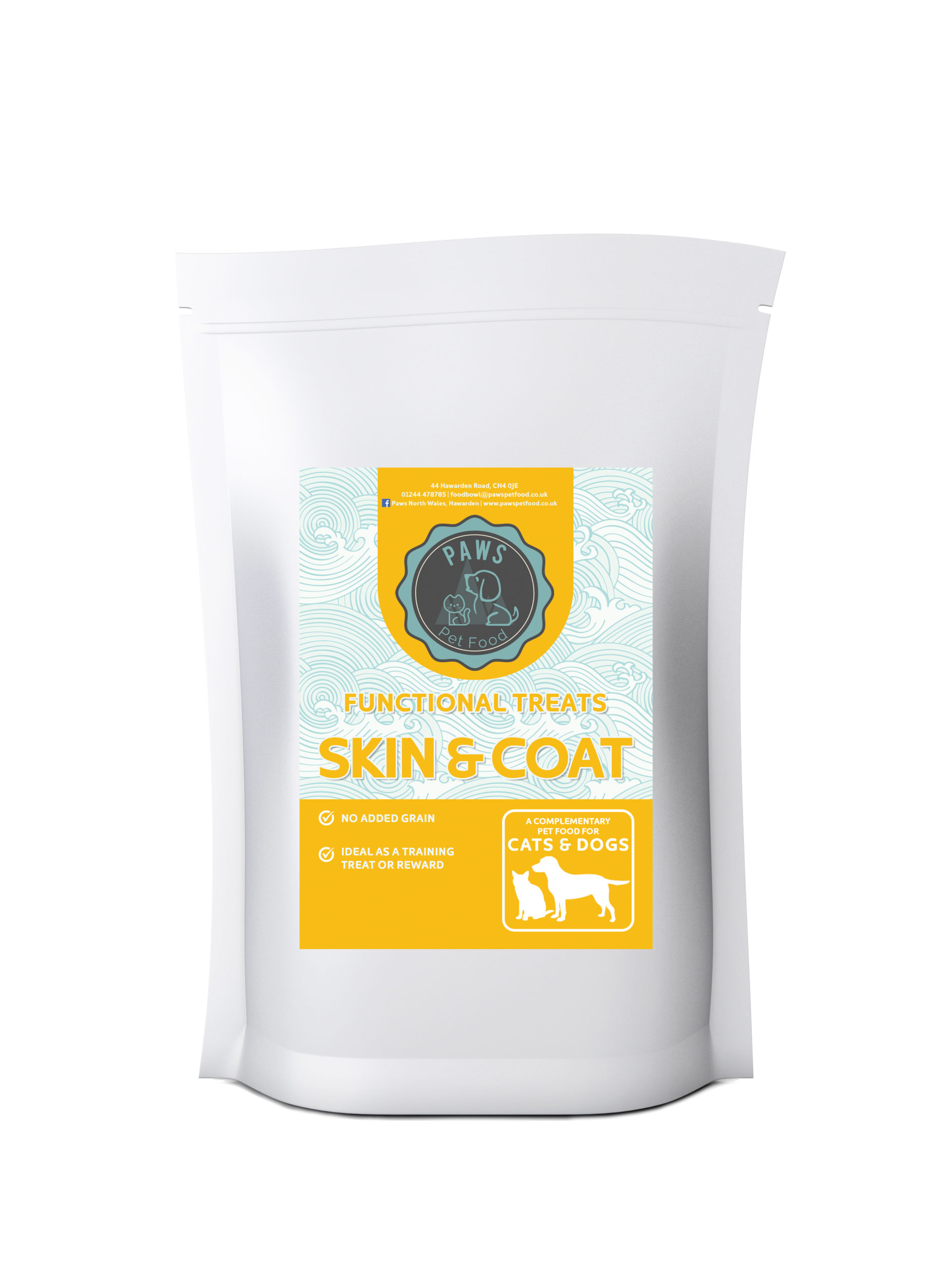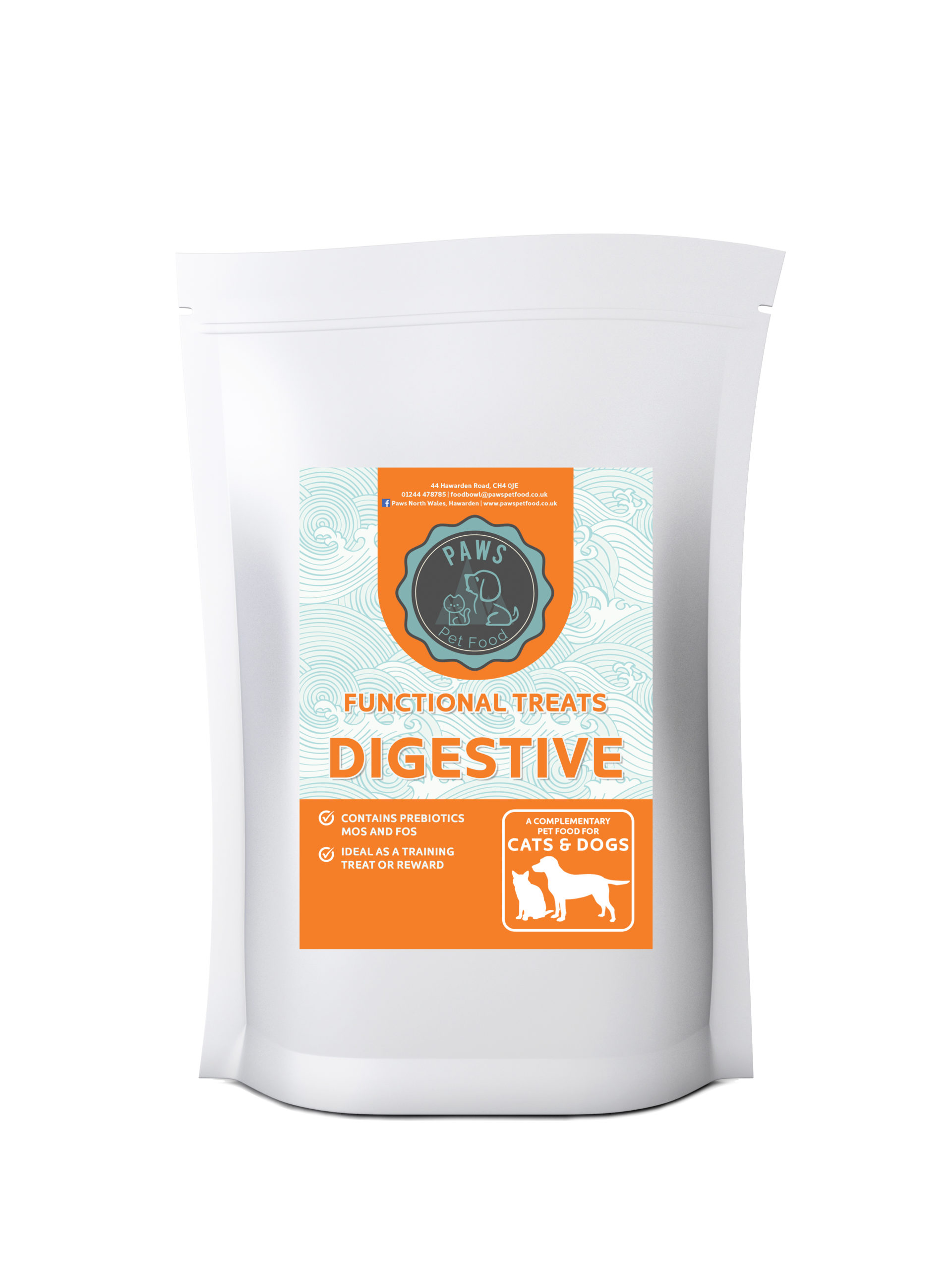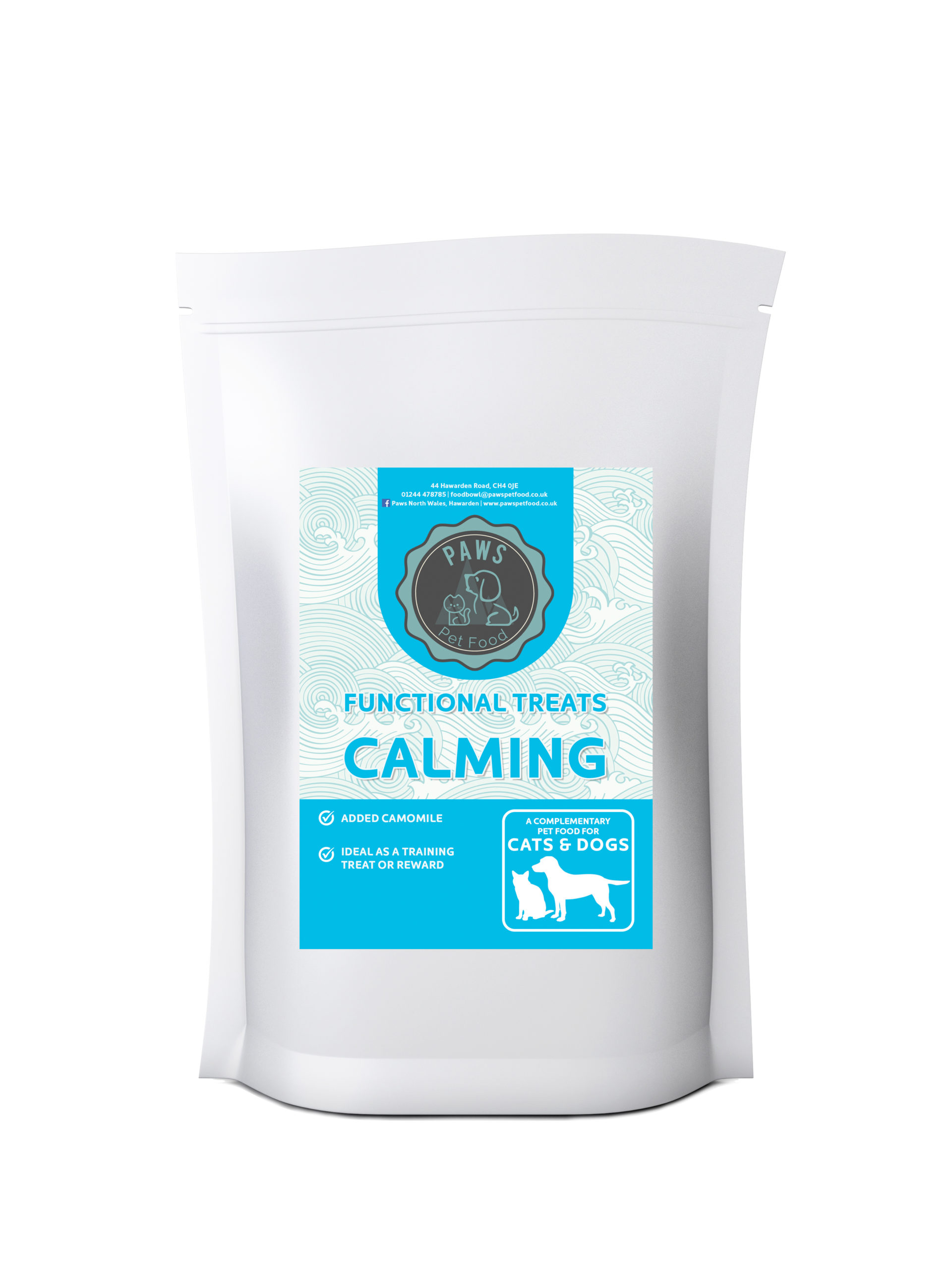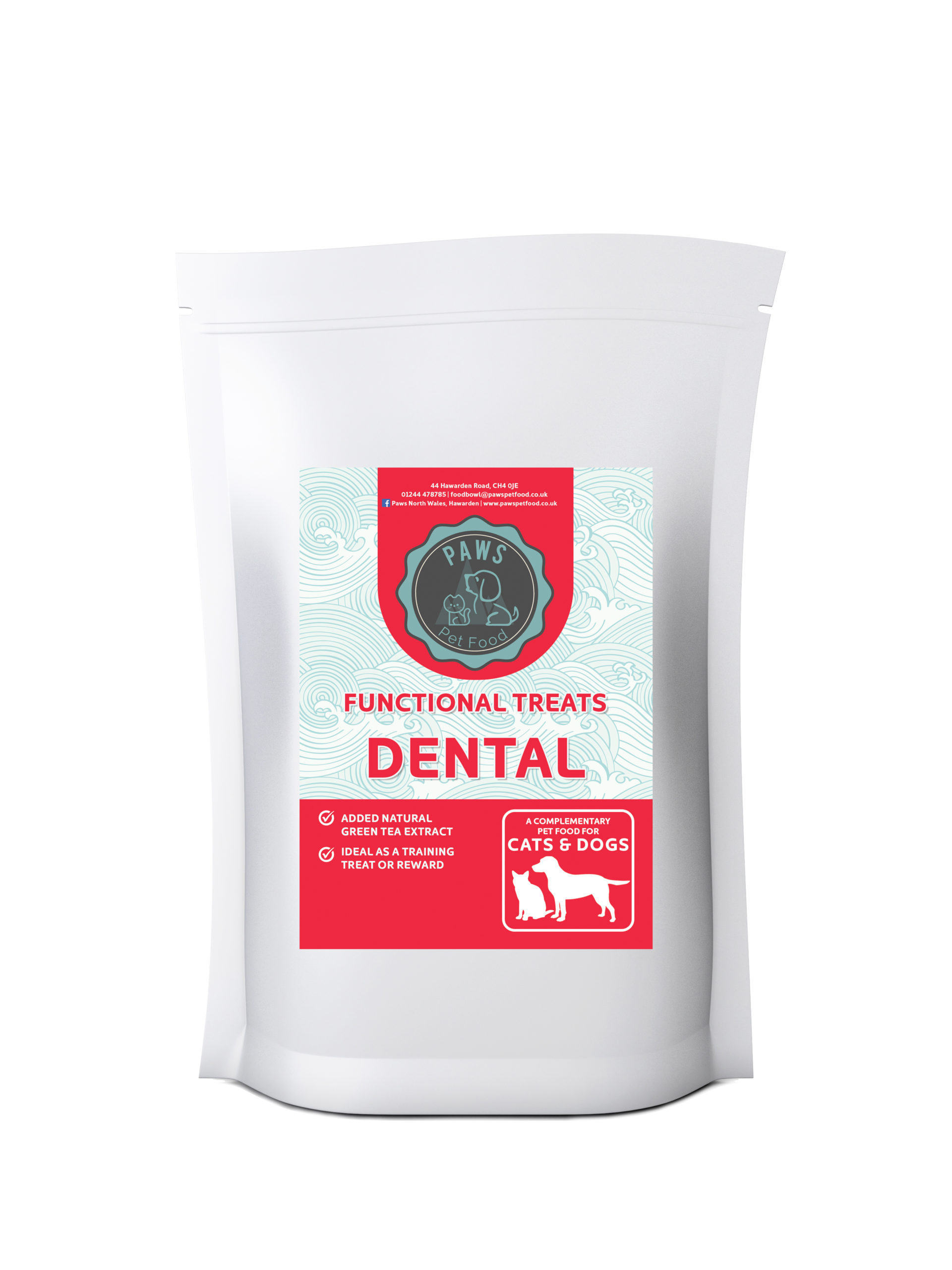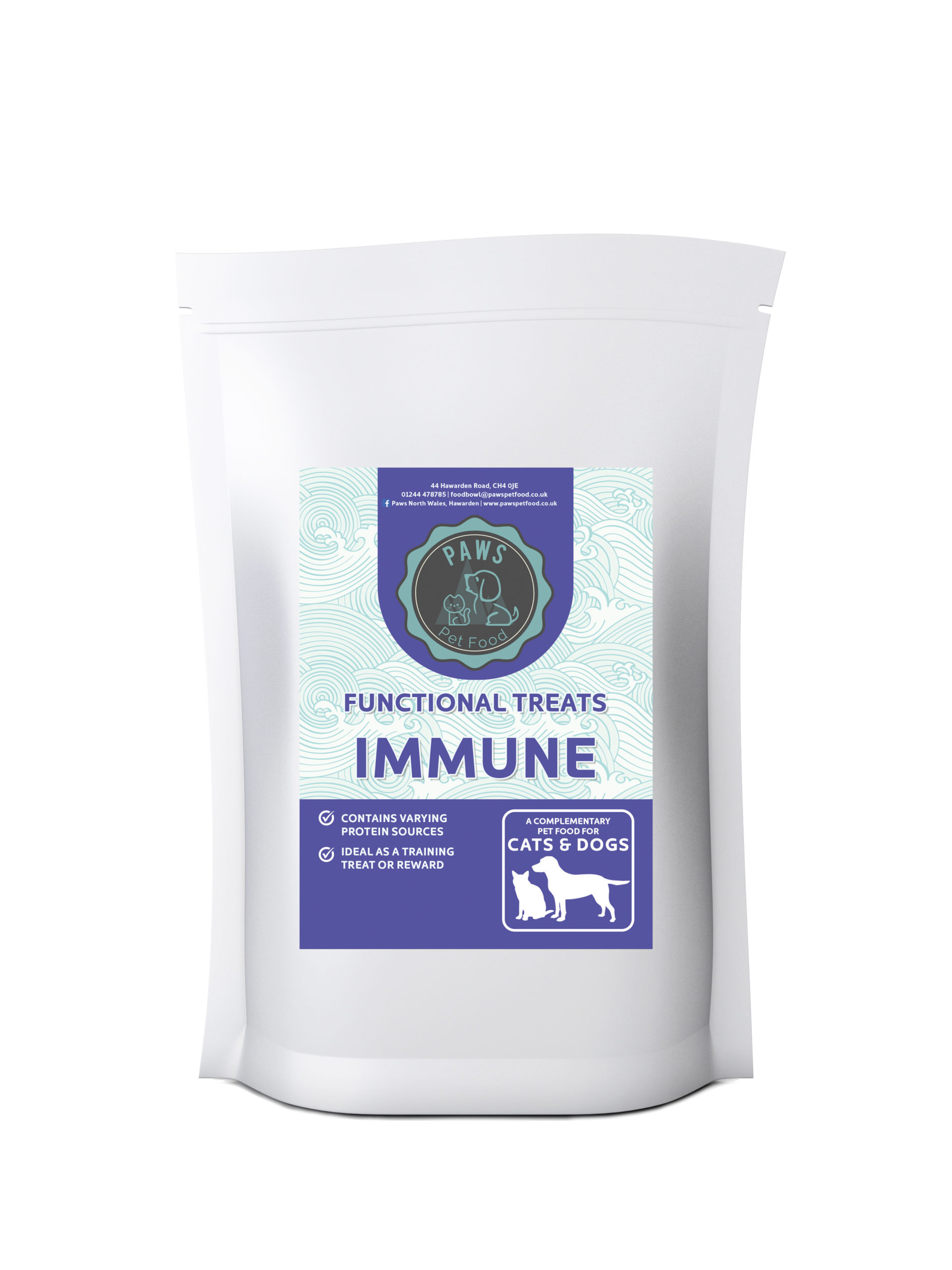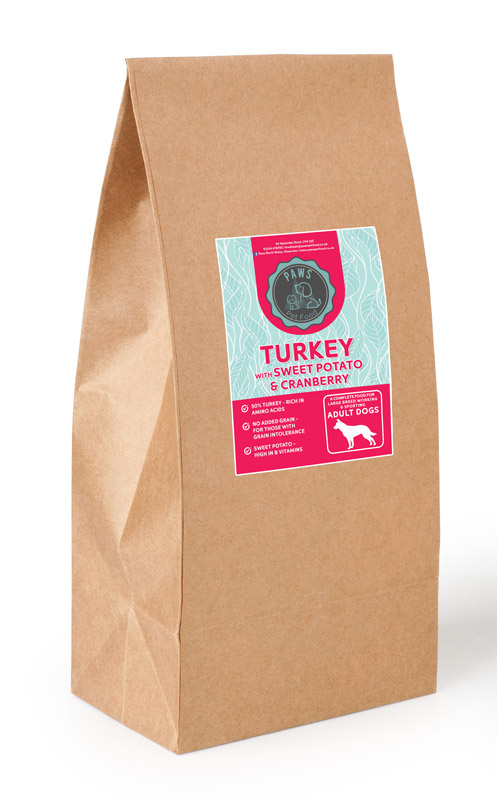Buy Online. Free DPD Delivery To Your Door.
Freshly produced dog food specifically designed grain free large breed dog food with nutritious ingredients, vitamins and supplements to help your dog.
Your dog needs all the love your can give them and includes what you feed them. Paws Pet Food’s Grain Free Large Breed range is has all the nutriants, vitamins and minerals which your dog will need so they can be part of your family for a long time to come.
Grain Free Large Breed Dog Food
Grain Free large breed Dog Food, Fad or Science? The rise in popularity of Grain Free Dog Food is clear but the scientific evidence for whether “grain free” is any better or worse for your dog is still out for debate. There are main food companies who will parade studies suggesting that their food is better than others however should you look into the details of these studies then the reality is, there is little… shall we say, un-bias or truly independent evidence.
Large Breed Dog Food
There is no clear definition for large or giant breeds but clearly there are certain define breeds like Great Dane and English Mastiff. Some groups define “giant breeds” as those heavier than 50 Kg (110lb) whilst not overweight. There are many advantages of having large breed dogs, they are often mature, soft and relaxed as adults. Giant breeds can develop health conditions like hip & elbow dysplasia, arthritis, osteosarcoma and debilitating bone and cartilage diseases.
Feeding your Large Breed Puppy
Controlling the growth rate of large breed dogs is vital for their good health and our specially formulated Large Breed Puppy Food is ideal for the task. It combines high quality protein, fibre, carbohydrates, vitamins and minerals and is cooks at a low 90 degrees Celsius so to retain the goodness. A responsible breeder should have given your advice about your Large Breed Puppy’s diet. If not the UK Kennel Club and the Royal Veterinary College both offer helpful easy to understand advice.
Overnutrition is just as dangerous to the development of your puppy as malnutrition. Their diets differ from regular or small breed puppies in that they require lower amount of; fat, calcium, phosphorus and vitamin D. Vets also recommend a controlled diet for Large Breed Puppies and therefore do not recommend free feeding.
Feeding your Large Breed Adult Dog
We highly recommend that during any transition with your pets that you consult your vet or nutritional experts and as they transition from puppy to adulthood it is an ideal time. The level of nutrition within you Large Breed Adult Dogs dog food can affect their susceptibility to common health issues like; Orthopedic disease, Obesity (which can led to joint issues, diabetes, kidney disease and high-blood-pressure later in life) and Bloat (gastric dilation and volvulus (GDV)).
Paw Pet Food has a full range of Large breed Dog Food which can assist your dog in maintaining their health.
So what is it we do know… and what can we trust?
We know that some dogs have allergies and some of those are to common grains such as Corn and Wheat. Food allergies are very rare however feeding them a grain free diet could be best. The Royal Veterinary College and has some brilliant advice on assessing the symptoms of allergies however like always if you think your pet is suffering from a allergy then please consult with your loved ones personal vet as they will be able to advise you best.
Paws Pet Food’s range of dog foods can assist with most common hypoallergic needs such as; gluten, diary, soya and grain. Paws Pet Food’s Grain Free Range uses Sweet Potato which is an amazing alternative of to grains and is a complex carbohydrate, high in a range of B Vitamins.
Why?
Most people who tell us that grain is bad for our dogs often suggest that the natural predecessor for our dogs are wolves who are carnivorous (only eat meat) and therefore suggest a “paleo,” approach to feeding dogs.
There is evidence that this is not true and according to ScienceMag most common breeds of dogs have between 4 and 30 different genes for amylase, a protein which starts to break down starch common in most grains. The study did highlight that certain breeds such as Sledge Dogs were exceptions and didn’t have these genes so if you have a specific breed please speak with your breeder to see if they have any specific needs. The UK Kennel Club can assist with advice if your breeder can’t but again we recommend you speak with you pets vet for more specific knowledge.
We think that it is important to remember although we have domesticated out pets, their organs such as pancreases have evolved some way but not sufficiently to efficiently digest plant material as a source of high-quality protein. This all suggests that a balanced diet is highly important to our dogs and a mixture of meat and vegetables is the right way to go.
The technical bit…
For those who want to go technical about it, studies show that most mammals require 22 different alpha amino acids which they need for various bodily functions or activities. Dogs can naturally produce 12 of these and therefore require the other 10 through there diet;
| Naturally Produced
Alanine Asparagine Aspartate Cysteine Glutamate Hydroxylysine Glycine Glutamine Proline Serine Hydroxyproline |
Only obtained via the diet
Arginine (Nuts, Seeds and Meats) Histidine (Meats, Fish, Soy, Beans, Grains, Eggs) Isoleucine (Meats, Fish, Dairy, Eggs) Methionine (Meats, Chicken, Fish, Diary, Eggs) Phenylalanine (Meat, Milk, Eggs) Tryptophan (Salmon, Chicken Eggs, Soy, Spinach) Threonine (Meats, Soy, Chick, Beans) Valine (Whole Grain, Vegetables, Soy, Cheese) Leucine (Meats, Diary, Soy, Beans) Lysine (Meats, Cheese, Fish, Soy) |
What about a raw diet?
Many people are currently raving about ‘Raw Diet,’ feeding for dog and cats. We need see the difference between “Raw Diet” and “Paleo Diet.” We believe, “Dogs can’t grow on meat alone.” They need an appropriate combination of protein, fat, carbohydrates, fibre, vitamins, minerals, and lots and lots more.
Paws Pet Food has three different ranges of dog food our Grain Free Range of dog food uses Sweet Potato which is a high protein alternative to grains and introduces an excellent balance of nutrients and minerals for those dogs who has an allergy or intolerance to wheat or rice grain. The Naturals Range of dog food, each recipe uses a different set of natural hypoallergenic ingredients to help those dogs with Wheat, Diary, Gluten and Soya intolerances. Finally, the Premium Range uses high quality ingredients to ensure your dog gets all the vitamins and minerals they deserve.
The quality of ingredients is so important
One argument in relation to going Grain Free is that some poor-quality pet foods used low grade grain which offered no nutritional value and merely ‘bulked out the food,’ to make the animal feel full and cost less in ingredients. The source of the ingredients you are feeding your dog are incredibly important. As such we try to use as much high-quality natural ingredients and often with no additives. Our manufacturing partners are registered with the Pet Food Manufacturers Association (PFMA) which governs over 90% of the pet food manufacturers and has strict codes of practice.
Reading food pet labels and knowing what to look for is a good start and here at Paws Pet Food we have built our knowledge from experience and clearly display all ingredients and nutritional information for each of our products online for you to easily see what your dog is eating.
- Made with Sweet Potato instead of Grain
- No added artificial colours, flavours or preservatives
- Ideal all your dog needs
Large Breed Dog Food Advice
Comprehensive Guide: Common Health Concerns in Dogs and How to Address Them
Canine Wellness Guide: Navigating Common Dog Health Concerns and Proactive Care Dogs, like any other living beings, can face a variety of health concerns. It's important for pet owners to be aware of these [...]
Tasty Goodness: Paws Pet Food’s Wheat-Free, Gluten-Free Salmon and Potato Kibble for Big Puppers!
Wheat Free Gluten Free Large Breed Puppy Salmon & Potato Puppy Dog Food Kibble Biscuits 2kg 12kg *Made in Wales* Welcome to a world where your furry friend's health and happiness take [...]
Large Breed Puppies Food – What should you feed them?
The dietary requirements of large and small breed puppies vary somewhat from their adult counterparts. With growth and development resulting in both increased and decreased requirements for various nutrients compared to adult maintenance. Meeting [...]
Hypoallergenic Pet Food – Separating the Facts from the Hype
What is a food allergy in dogs and cats? Dogs and cats may display adverse reactions to food that can be broadly divided into two groups – immunological (food allergy) and non-immunological. A food [...]
Collagen in Pet Food
What is Collagen? In nature, collagen is a protein found exclusively in animals, especially in the skin, bones and connective tissues of mammals, birds and fish. Strictly speaking, collagen is actually a family of [...]
What dog food should I feed my dog?
A common query from pet owners is “what diet should I feed my dog?”. With so many dog food brands available to choose from, a decision can be hard to make. It is important [...]




